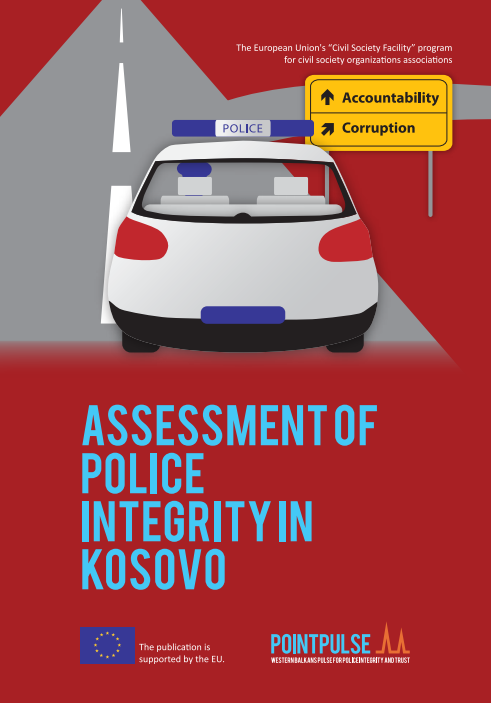4/12/2015

Kosovar Center for Security Studies (KCSS); Belgrade Center for Security Policy (BCSP)
Plator Avdiu dhe Skender Perteshi
This report aims to assess the integrity within the Kosovo Police and to address the key problems and challenges. Progress and regress in relation to police integrity is measured through six sections or indicators: the transparency of police work, the influence of political interests on the operational work of the police, human resources management, financial management, internal control and external oversight of police work. Given that this is a comprehensive study, it provides a qualitative analysis of the relevance of integrity principles, with the aim of keeping the Kosovo Police accountable, honest and ethical.
The study revealed six major findings. (i) In general, the Kosovo Police is transparent in terms of providing information to the media and the public. The police Information and Public Relations Office is in charge of conducting all the activities related to transparency. However, the police are far from being perfect in this context. There should be far less bureaucracy when it comes to access, statistics, data and detailed information about its work. Therefore, the Kosovo Police should be more proactive to ensure its timely transparency concerning the requests from media, non-governmental organizations and other relevant parties.
(ii) As long as there are assumptions that the police is under political control of the executive power, this area remains among the most sensitive. The current legal framework does not guarantee full operational independence from the Kosovo Government and the Ministry of Internal Affairs. Senior management of the police is politically elected by the Minister of Internal Affairs and the Prime Minister. In addition, the Kosovo Police is accused of having been under political pressure during the 2015 opposition protests against the Government. Also, the majority of Kosovo citizens believe that the political influence on the police is very strong.
(iii) The legislation on the recruitment and ranking system is considered good; however, the Draft Law on Early Retirement of Police Officers has not yet been enacted. The biggest challenges to the human resources management within the police are the ranking process, early retirement, and recruitment of new police officers. The Kosovo Police is considered among the ‘oldest’ police forces in the region and should therefore be reformed. In total, there are 7,634 police officers on active duty. There is a need to provide the police units, civilian personnel and police officers of different ranks within the police with additional training in order to improve the performance of the administrative part of the police as well as police authorization.
(iv) In the last three years, the Kosovo Police was subjected to criticism regarding the management of public funds, particularly concerning its public procurement system. This sector was criticized in international and local organizations’ reports for not being transparent, accountable and for not respecting the law and the public procurement procedures. The KP has managed to establish bodies in charge of internal control and management of public finances, such as an internal audit unit and a public procurement department.
(v) Legal and policy documents regulating the mechanisms of internal control of police work are in place. However, further progress is needed to strengthen the integrity policy and define it even better. Furthermore, the Kosovo Police does not have its own integrity plan, and there should be integrity tests to assess the performance of police officers. Despite this, every year the police performs a performance assessment of police officers through a questionnaire related to the daily work of each officer. The Police Inspectorate, which is an agency independent from the police and operating within the Ministry of Internal Affairs, has not been able to provide integrity tests for police officers.
(vi) There is a need to improve the external oversight of institutions over the work of the police. Parliamentary oversight has been insufficient to supervise the implementation of the Law on Police and other related activities of the Kosovo Police in the years 2014 and 2015. In these two years, it has not provided any monitoring reports on the police. As regards the submission of asset declarations of senior police officers to the Anti-Corruption Agency, the latter does not have a legal mandate to verify financial and material sources of declared assets.
The Report is published as part of the Action “Western Balkans Pulse for Police Integrity and Trust: POINTPULSE”. The Action is supported by the European Union through the program “Civil Society Facility” under the Instrument for Pre-Accession Assistance (IPA). The contents of the Report are the sole responsibility of the Kosovar Centre for Security Studies (KCSS) and views expressed in this document are not necessarily those of the European Union.